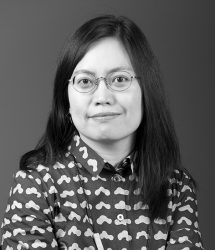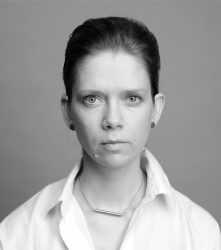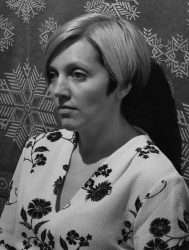People
Dr Nithikul Nimkulrat

Research Group Leader / Professor in Textile Design
Nithikul Nimkulrat is a practitioner-researcher who intertwines research with textile practice, focusing on experiential knowledge in craft processes in the context of design research. Nithikul has worked at Aalto University (FI, 2004–2010), where she earned a doctorate in 2009, and Loughborough University (UK, 2011–2013), and is currently Professor and Head of Department of Textile Design at Estonian Academy of Arts (EE, 2013–present). Nithikul is an editor of Crafting Textiles in the Digital Age (Bloomsbury, 2016). She is an elected council member of Design Research Society (DRS) and Convener of DRS Special Interest Group on Experiential Knowledge (EKSIG). Nithikul is a member of the editorial board of the following journals: Artifacts; Studies in Material Thinking and Journal of Research Practice.
Nithikul’s current research interest lies in correlation between craft practice and science as well as digital technology. During her research residency in Autumn 2017 at Emily Carr University of Art + Design (CA), she carried out an exploration of hand crafting using digital means such as 3D printing and Virtual Reality (VR). Since 2013 she has performed research in collaboration with mathematicians to examine the relationship between textile knots and mathematical knot theory and tiling concepts and ways in which these mathematical concepts can be used as tools for designing new textile knot patterns and structures.
ETIS page: https://www.etis.ee/CV/Nithikul_Nimkulrat/eng?lang=ENG
Personal website: www.nithikul.com
Email: nithikul.nimkulrat@artun.ee
Selected recently published publications
Nimkulrat, N., Ræbild, U. and Piper, A. (eds.) (2018). Soft Landing: Cumulus Think Tank Publication No. 3. Helsinki: Aalto University, School of Arts, Design and Architecture.
Nimkulrat, N. and Matthews, J. (2017). Ways of Being Strands: Cross-Disciplinary Collaboration Using Craft and Mathematics. Design Issues, 33(4), 59–72. doi: 10.1162/DESI_a_00461
Nimkulrat, N., Kane, F. and Waltan, K. (eds.) (2016). Crafting Textile in the Digital Age. London: Bloomsbury.
Dr Kristi Kuusk

Design Researcher / Associate Professor in Textile Futures
Kristi Kuusk is a designer-researcher working on the direction of crafting sustainable smart textile services. She is looking for new ways for textiles and fashion to be more sustainable through the implementation of technology. In 2016 Kristi presented her PhD project Crafting Sustainable Smart Textile Services on craft and sustainability qualities in smart textiles at the Eindhoven University of Technology in Designing Quality in Interaction research group. The related collaborative design work has been presented in various international exhibitions, shows and conferences. Since 2016 she works as an Associate Professor and researcher in the textile futures direction at the Estonian Academy of Arts. In 2017 Kristi’s project Magic Lining was awarded by the jury of VERTIGO (STARTS Residencies) to collaborate with ICT R&D projects with the goal of producing original artworks featuring innovative use-cases of the developed technologies. In 2018 her explorative children clothing brand Spellbound was selected by the jury of WORTH (COSME Programme of the European Union) as one of the winning projects for transnational creative collaboration.
ETIS page: https://www.etis.ee/CV/Kristi_Kuusk/est?lang=ENG
Personal website: www.kristikuusk.com
Email: kristi.kuusk@artun.ee
Selected recently published publications
Kuusk. K., and Nimkulrat, N. (2018). Opportunities of Interactive Textile-Based Design for Education Tools for Children with Various Spectrums of Alertness Sensitivities. In N. Nimkulrat, U. Ræbild and A. Piper (eds.) Soft Landing: Cumulus Think Tank Publication No. 3 (pp. 101–111). Helsinki: Aalto University, School of Arts, Design and Architecture.
Kuusk, K. (2016). Crafting Sustainable Smart Textile Services. Eindhoven: Eindhoven University of Technology.
Kuusk, K. Wensveen, S.A.G. and Tomico, O. (2016). Craft Qualities Translated From Traditional Crafts to Smart Textile Services. Studies in Material Thinking, 14. https://www.materialthinking.org/sites/default/files/papers/0176_SMT_V14_P05_FA_0.pdf
Julia Valle-Noronha

Design Researcher / Associate Professor in Fashion
Julia is Associate Professor in Fashion at the Estonian Academy of Arts and doctoral candidate in Design at Aalto University. She holds an MA in visual arts and a professional background in fashion design. As a designer–researcher, her work explores wearer–worn relationships and alternative approaches to commercial fashion via practice-based inquiries.
Personal website: www.juliavalle.com
Email: julia.valle@artun.ee
Selected recently published publications
Valle-Noronha, J., Wilde, D. (2018) The intervened wardrobe: Making visible the agency of clothes. dObra[s], 197-217. https://doi.org/10.26563/dobras.v11i23.718
Valle-Noronha, J., Niinimäki, K. and Kujala, S. (2018) Learning to Wear: Notes on Wearer Worn Attachments. Clothing Cultures, 5(2), 225-246. https://doi.org/10.1386/cc.5.2.225_1
Valle-Noronha, J. (2017) On the agency of clothes: Surprise as a tool towards stronger engagements. Proceedings of the 3rd Biennial Research Through Design Conference, Edinburgh. 519-534. https://doi.org/10.6084/m9.figshare.4747033
Dr Reet Aus

Reet Aus is a fashion designer/researcher, working in the field of circular design. She defended her doctoral thesis “Trash to Trend: Using Upcycling in Fashion Design” in 2011, at the Estonian Academy of Arts (EKA). That led to creating a community platform for designers who upcycle, called Trash to Trend. In 2013 she teamed up with SEI Tallinn, to create a novel circular business model, called UPMADE. Applying the method of upcycling in the manufacturing of textiles on an industrial scale. In 2014 UPMADE certified its first garment producer In Bangladesh. In its first five years (of business äkki) UPMADE has saved 174 826 127 litres of water and 108 576 kg of CO2, having saved 12 980 kg of textile waste from landfill and converted it into new clothes instead. Aus realizes her designs through Upmade certified brand Reet Aus. Aus has lead the Sustainable Design Lab at EKA since 2016. The same year she was also awarded with the Order of the White Star, class V. In 2017 Nordic Business Report included Aus in their list of Top 20 Responsible Leaders in Northern Europe.
ETIS page: https://www.etis.ee/CV/Reet_Aus/est?lang=ENG
Email: reet.aus@artun.ee
Selected recently published publications
Aus, R., Moora, H., Vihma, M., Belmane, N., Student Innovation Labs in Design Education: The Case of the Sustainable Design Lab at the Estonian Academy of Arts, Cumulus REDO conference 2017: Cumulus Kolding 2017, Design School Kolding & Cumulus International Association, (2017)
Aus, Reet, Trash to Trend – Using Upcycling in Fashion Design, Estonian Academy of Arts, Tallinn, Estonia (2011)
Ruth-Helene Melioranski

Doctoral Student / Designer
Ruth-Helene Melioranski is researching complex societal challenges with systems and human-centred design methods. Through practice-based research projects she is conceptualising new and emerging design practices both in professional and higher educational contexts. In her professional practice she is leading several strategic, service and co-design projects which aim to help partners to vision their future possibilities and build scenarios. In parallel, she works at Tallinn University of Technology’s (TalTech) developing the Design & Technology Futures (a joint international master’s programme of the TalTech and EKA) and supervises students’ teams with their design driven innovation projects. In addition, Ruth-Helene has been researching design policies and design support programmes since 2005 while she led the research of the Estonian design scene as a partner of the Nordic-Baltic innovation platform for Creative Industries. She was the founding director of the Estonian Design Centre (2008-2011) and prior to that the leader of the Estonian Design Year (2006-2007). Her wide experience in the field includes the participation of several international cooperation programmes, like European Design Training Incubator, a collaborative platform to foster exchange, share resources and benchmark Continuous Professional Development to foster the use of design as an economic driver; and Sharing Experience Europe (SEE) Platform, a network of European partners engaging with government to integrate design into innovation policies and programmes.
ETIS page: https://www.etis.ee/CV/Ruth-Helene_Melioranski/eng?lang=ENG
Email: ruth.melioranski@artun.ee
Selected recently published publications
Gulari, M. N., Melioranski, R.-H., Er, O. and Fremantle, C. (2017). The Future of Design Support: What Can We Learn From Design Support Experience in the UK, Estonia and Turkey?, The Design Journal, 20(1), 669–680,
Melioranski, R.-H. (2015). Tackling Societal Challenges Requires Improved Design methodology. ORIGINS, 1/2015, 16−30.
Falkenberg, V., Kotsjuba, D., Lepik, P-R., Levald, A., Lillemaa, M., Lubjak, I., Maas, H., Melioranski, R.-H., Mikola, A., Peetsalu, K., Pukk, M., Rummel, K., Vaikla, T.-K., Valk, V. (2012). Kõiki kaasava elukeskkonna kavandamine & loomine. Tallinn: Eesti Arhitektide Liit, Eesti Kunstiakadeemia, Eesti Disainikeskus
Jaana Päeva

Doctoral Student / Accessory Designer
Jaana Päeva studied leather art, a specialism that is concerned with the creation of artefacts for various contextual applications, from ornamental leatherwork and bookbinding to fashion accessories. Jaana’s MA thesis completed at the Estonian Academy of Arts in 2001 examined black leather as a message carrier, resulting in a collection of conceptual bags. After that, Jaana has worked professionally as a bag and shoe designer and taught students at the Estonian Academy of Arts. After 15 years of leading practical workshops and holding theoretical lectures, Jaana decided to pursue her PhD studies.
Her doctoral research examines handbags as visual signs from a designer perspective. It investigates the potentiality of a handbag as a carrier of messages in contemporary design. The central research question is: What provides a meaning to a handbag and what are the characteristics that can form a message? The designer approach to the artistic research aims to encourage non-verbal communication and to apprehend the personal and/or community identity through everyday commodities.
ETIS page: https://www.etis.ee/CV/Jaana_Päeva/est?lang=ENG
Email: jaana.paeva@artun.ee
Selected recently published publication
Päeva, J. (2017). EKA nahakunsti osakond 100. Inimesed, lood, faktid [EKA Department of Leather Art 100. People, Stories and Facts]. In EKA nahakunst 100 [EKA Leather Art 100] (pp. 6−69). Tallinn: Eesti Kunstiakadeemia nahakunsti osakond.
Katrin Kabun

Doctoral Student / Textile Designer
Katrin Kabun is a doctoral student at the Estonian Academy of Arts. Her PhD research Rehabilitation of Sheep Wool – Application of Archaic Material in Contemporary Design is concerned with the implementation of sheep wool as a valuable renewable resource in contemporay design. The research explores ways in which non-standard wool fibers can be applied to the context beyond the traditional wool usage and can create sustainable solutions.
Katrin completed her Master of Arts in 2017 at the Estonian Academy of Art. The thesis focused on wool fibres which do not meet the standards of quality for yarn and felt making (i.e. waste wool) and on the creation of biodegradable composite materials from waste wool.
ETIS page: https://www.etis.ee/CV/Katrin_Kabun/est?lang=ENG&tabId=CV_ENG
Personal website: www.katrinkabun.com
Email: katrin.kabun@artun.ee
